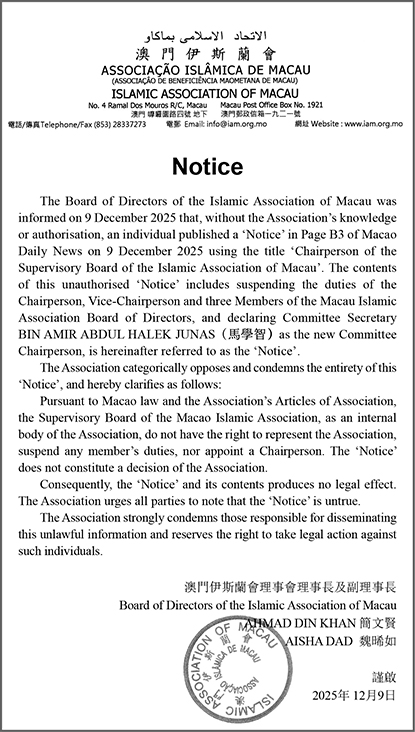Macau passes COVID-19 testing drive with flying colours but vaccination hesitancy still a drag
Editorial
Macau passed its COVID-19 mass testing campaign last week with flying colours, proving once again that our city has an indomitable can-do spirit.
All the citywide programme’s 614,465 test results proved negative – which is 100 percent positive for our city. Another 101,786 tests conducted outside the programme also all proved negative – another positive development.
Some of my local friends said the testing campaign’s fortunate results showed once more that Macau is an inherently lucky place. Well, that’s a deeply engrained and spiritually pleasing folk intuition.
Many locals, of course, hoped for the programme’s outcome of zero infections but I am sure that very few – if any – people expected it. Actually, I don’t know anyone who expected the campaign to only confirm negative test results.
Of course, we need to stay alert. What the outcome means, realistically, is that if a person tests negative, he or she probably was not infected at the time the swab was taken. The fact is that false negative test results can occur for a variety of reasons. That’s why I wouldn’t mind a second or even a third round of citywide testing – safety first! President Xi Jinping has appropriately described COVID-19 as a “vicious” virus.
As a deep-dyed realist I am convinced that the campaign’s positively surprising outcome is mainly due to the local government’s successful COVID-19 prevention and control measures and its close cooperation with the National Health Commission (NHC) and other authorities in the mainland. Thanks to Guangdong’s deployment of 300 medical workers to Macau, last week’s high-intensity testing programme could be completed quite smoothly and on schedule (with the exception of a few stragglers who were graciously given a 12-hour reprieve on Saturday).
It’s true that the campaign started with some organisational hiccups and a computer glitch which resulted in very long queues on the campaign’s first day. Chief Executive Ho Iat Seng behaved uprightly by apologising right away for the snafu and speedily readjusting the testing arrangements such as by putting an end to walk-ins.
A friend of mine, a domestic helper from the Philippines, queued for five hours late at night outside one of the local schools’ testing sites on Wednesday night. She said she didn’t mind because lining up for hours was worthwhile as it could help “fish out” COVID-19 carriers. Besides, she met lots of her compatriots during the long wait, and we all know that chatting away is the best way to kill time.
I went to the Grand Lisboa basement testing station right after putting our newspaper to bed at 3:30 a.m. on Friday. I was in luck as there were only two people ahead of me. The whole procedure lasted just a few minutes and I celebrated my unexpected serendipity by going up to the casino-hotel’s 24-hour coffee shop for a toothsome sandwich.
The government restarted yesterday its COVID-19 vaccination campaign after a short interruption during the mass testing programme – glad tidings indeed.
The crux of the problem is that Macau’s vaccination rate is embarrassingly low. Just about 43 percent of the population has been fully inoculated against the submicroscopic infectious agent that replicates only inside the living cells of an organism – and that’s the problem as it needs us to reproduce! The inoculation drive began back in February.
Many locals’ vaccination shilly-shallying is unfathomable – the jabs are free of charge, plentiful and very safe. The adverse event rate stood at just 0.43 percent yesterday. Besides, people in Macau have the luxury of being able to choose between two different brands – in many countries and territories people don’t have a choice, need to pay, or even don’t have access to COVID-19 vaccines at all.
I wonder when – if ever – Macau will be able to achieve herd immunity, which reportedly requires a vaccination rate of between 70 and 80 percent – scientists are still debating the issue and the WHO says that while “the proportion of the population that must be vaccinated against COVID-19 to begin inducing herd immunity is not known,” … “achieving herd immunity with safe and effective vaccines makes diseases rarer and saves lives.”
That’s why I hope that the government will redouble its effort to convince locals to get jabbed. In my view, the carrot-and-stick approach, i.e. the combination of both reward and punishment to induce a desired behaviour, is the most efficient way of implementing difficult political decisions. Interestingly enough, the motivational approach is known in Portuguese as “pão-e-pau” (“bread-and-stick”) and in German as “Zuckerbrot und Peitsche” (“sugar bread and whip”). Well, languages have different ways of getting the same message across.
I think the Macau government should reward those who have been fully vaccinated and penalise vaccination hesitancy, such as easing travel restrictions for those who have been inoculated and barring the unvaccinated from entering certain public premises such as shopping malls – the favourite destination of many locals in their leisure time – or booking a flight.
One can only hope that after last week’s Delta variant scare Macau’s vaccination waverers finally change their stance.
Anyway, let’s hope that Macau can leave its first ever “state of immediate prevention” behind next week on schedule.
– Harald Brüning








